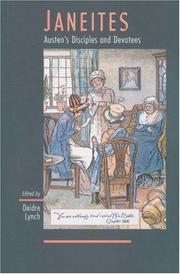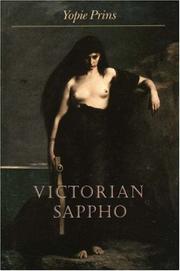| Listing 1 - 2 of 2 |
Sort by
|

ISBN: 0691050058 0691050066 0691216088 Year: 2000 Publisher: Princeton University Press
Abstract | Keywords | Export | Availability | Bookmark
 Loading...
Loading...Choose an application
- Reference Manager
- EndNote
- RefWorks (Direct export to RefWorks)
This study explores the phenomenon of the "Janeite," the zealous reader and fan of Jane Austen whose devotion to her novels has been frequently invoked and often derided by the critical establishment. The text asks what Janeites do and explores the myriad appropriations of Austen.
Love stories, English --- Reading interests. --- Women and literature --- History and criticism. --- History --- Austen, Jane, --- Criticism and interpretation --- History. --- Appreciation. --- Influence. --- Aufsatzsammlung --- Rezeption --- Geschichte --- Invloed. --- Women and literature. --- Romance fiction, English. --- Influence (Literary, artistic, etc.) --- Art appreciation. --- Lecture, Goût de la. --- Roman anglais --- Femmes et litterature --- Romance fiction, English --- English romance fiction --- English fiction --- Interests, Reading --- Reader interest --- Reading, Choice of --- Reading habits --- Books and reading --- Appreciation of art --- Art --- Art criticism --- Literature --- Artistic impact --- Artistic influence --- Impact (Literary, artistic, etc.) --- Literary impact --- Literary influence --- Literary tradition --- Tradition (Literature) --- Influence (Psychology) --- Intermediality --- Intertextuality --- Originality in literature --- Histoire --- Analysis, interpretation, appreciation --- Austen, Jane. --- Austen, Jane --- Critique et interpretation --- Histoire. --- England. --- Angleterre --- Anglii︠a︡ --- Inghilterra --- Engeland --- Inglaterra --- Anglija --- England and Wales --- Reception of art --- Reception --- Landesgeschichte --- Regionalgeschichte --- Ortsgeschichte --- Zeitgeschichte --- Geschichtsphilosophie --- Vergangenheit --- Fortwirken --- Nachwirkung --- Nachleben --- Wirkungsgeschichte --- Aneignung --- Auswirkung --- Fortleben --- Beiträge --- Einzelbeiträge --- Sammelwerk --- Ao-ssu-ting, --- Ao-ssu-ting, Chien, --- Aosiding, --- Aosiding, Jian, --- Āsṭin̲, Jēn̲, --- Austenová, Jane, --- Author of Sense and Sensibility, --- Lady, --- Osten, Dzheĭn, --- Ostin, Dzhein, --- Aosiding --- Aosiding, Jian --- Ao-ssu-ting, Chien --- Ao-ssu-ting --- Austenová, Jane --- Austenové, Jane --- Austenova̋ Jane --- Awsten, Jeyn --- Osten, Dzheĭn --- Остен, Жейн --- Ostin, Dzhein --- Ostin, Džejn --- Ostin, Zhejn --- Остин, Жэйн --- Ostjen, Zhjejn --- 奥斯丁 --- 奧斯婷 --- 珍·奧斯婷 --- 简·奥斯汀 --- 簡·奧斯汀 --- Schriftstellerin --- Librettistin --- Steventon (Hampshire) --- Winchester --- Bath --- Austen, Cassandra --- Austen, James --- Austen, Charles --- De Feuillide, Eliza --- Hawke, Cassandra --- Knight, Caroline Jane --- Austen-Leigh, Lois --- 1775-1817 --- 16.12.1775-18.07.1817 --- Anglii͡ --- Austen societies. --- Austeniana. --- Benedict, Barbara M. --- Booth, Wayne. --- Brontës. --- Castle, Terry. --- Eliot, George. --- Firbank, Ronald. --- Gibbons, Stella. --- Halperin, John. --- Johnson, Claudia L. --- Kipling, Rudyard. --- Lewes, George Henry. --- Lynch, Deidre. --- Oliphant, Margaret. --- Repplier, Agnes. --- Trilling, Lionel. --- country house novel. --- decadence. --- democracy. --- embarrassment. --- gossip. --- heritage cinema. --- influence. --- marriage. --- masculinity. --- modernism. --- national identity. --- naturalization. --- slavery. --- spinsterhood.

ISBN: 0691059195 0691059187 0691222150 Year: 1999 Publisher: Princeton University Press
Abstract | Keywords | Export | Availability | Bookmark
 Loading...
Loading...Choose an application
- Reference Manager
- EndNote
- RefWorks (Direct export to RefWorks)
What is Sappho, except a name? Although the Greek archaic lyrics attributed to Sappho of Lesbos survive only in fragments, she has been invoked for many centuries as the original woman poet, singing at the origins of a Western lyric tradition. Victorian Sappho traces the emergence of this idealized feminine figure through reconstructions of the Sapphic fragments in late-nineteenth-century England. Yopie Prins argues that the Victorian period is a critical turning point in the history of Sappho's reception; what we now call "Sappho" is in many ways an artifact of Victorian poetics. Prins reads the Sapphic fragments in Greek alongside various English translations and imitations, considering a wide range of Victorian poets--male and female, famous and forgotten--who signed their poetry in the name of Sappho. By "declining" the name in each chapter, the book presents a theoretical argument about the Sapphic signature, as well as a historical account of its implications in Victorian England. Prins explores the relations between classical philology and Victorian poetics, the tropes of lesbian writing, the aesthetics of meter, and nineteenth-century personifications of the "Poetess." as current scholarship on Sappho and her afterlife. Offering a history and theory of lyric as a gendered literary form, the book is an exciting and original contribution to Victorian studies, classical studies, comparative literature, and women's studies.
English poetry
---
Feminism and literature
---
Feminist poetry, English
---
Homosexuality and literature
---
Love poetry, Greek
---
Poetics
---
Women and literature
---
Greek influences.
---
History and criticism.
---
History
---
History and criticism
---
Theory, etc.
---
Translations into English
---
Geschichte 1832-1902.
---
Poesie anglaise
---
Engels.
---
Letterkunde.
---
Receptie.
---
Lyrik
---
Liebeslyrik
---
Griechisch
---
Women and literature.
---
Poetics.
---
Influence (Literary, artistic, etc.)
---
Homosexuality and literature.
---
Feminist poetry, English.
---
Feminism and literature.
---
English poetry.
---
Art appreciation.
---
LITERARY CRITICISM
---
Influence grecque.
---
Histoire et critique.
---
Poetry.
---
Sappho.
---
Sappho,
---
Sappho
---
Englisch ...
---
Influence.
---
Appreciation
---
Criticism and interpretation
---
Griechisch.
---
Englisch.
---
Greece.
---
England.
---
Literature
---
English feminist poetry
---
Literature and homosexuality
---
Artistic impact
---
Artistic influence
---
Impact (Literary, artistic, etc.)
---
Literary impact
---
Literary influence
---
Literary tradition
---
Tradition (Literature)
---
Art
---
Influence (Psychology)
---
Intermediality
---
Intertextuality
---
Originality in literature
---
Poetry
---
Greek love poetry
---
Greek poetry
---
Criticism
---
Evaluation of literature
---
Literary criticism
---
Rhetoric
---
Aesthetics
---
English literature
---
Appreciation of art
---
Reception of art
---
Art criticism
---
Women authors
---
Technique
---
Evaluation
---
Analysis, interpretation, appreciation
---
Reception
---
Angleterre
---
Anglii︠a︡
---
Inghilterra
---
Engeland
---
Inglaterra
---
Anglija
---
England and Wales
---
al-Yūnān
---
Ancient Greece
---
Ellada
---
Ellas
---
Ellēnikē Dēmokratia
---
Elliniki Dimokratia
---
Grčija
---
Grèce
---
Grecia
---
Gret︠s︡ii︠a︡
---
Griechenland
---
Hellada
---
Hellas
---
Hellenic Republic
---
Hellēnikē Dēmokratia
---
Kingdom of Greece
---
République hellénique
---
Royaume de Grèce
---
Vasileion tēs Hellados
---
Xila
---
Yaṿan
---
Yūnān
---
Ελληνική Δημοκρατία
---
Ελλάς
---
Ελλάδα
---
Греция
---
اليونان
---
يونان
---
希腊
---
Aeolians.
---
Alcaeus.
---
Anactoria.
---
Aristaenetus.
---
Baudelaire.
---
Browning, Robert.
---
Butler, Judith.
---
Cape Coast Castle.
---
Catullus.
---
Cypris.
---
Euterpe.
---
Frothingham, Ellen.
---
Greer, Germaine.
---
Hades.
---
Hegel.
---
Hellenism.
---
Hephaestion.
---
Hymen.
---
Jackson, Virginia.
---
Jenkyns, Richard.
---
Kamuf, Peggy.
---
Lang, Cecil.
---
Lethe.
---
Longinus.
---
Lootens, Tricia.
---
Phaon.
---
ballad.
---
chiasmus.
---
collaboration.
---
colometry.
---
deconstruction.
---
defacement.
---
dismemberment.
---
drowning.
---
echo.
---
epic.
---
epistle.
---
falling.
---
flagellation.
---
forgetting.
---
grammar.
---
invocation.
---
literary history.
---
love lyric.
---
masochism.
---
memorization.
---
metalepsis.
---
metonymy.
---
nomination.
---
organic form.
---
pathos.
---
personification.
---
Literature and feminism
---
Altgriechisch
---
Klassisches Griechisch
---
Hellenisch
---
Indogermanische Sprachen
---
Gräzistik
---
Liebesgedicht
---
Liebesdichtung
---
Erotische Lyrik
---
Liebeslied
---
Gedicht
---
Poem
---
Dichtung
---
Poesie
---
Lyrisches Werk
---
Lyrikwerk
---
Gedichtwerk
---
Literatur
---
<
| Listing 1 - 2 of 2 |
Sort by
|

 Search
Search Feedback
Feedback About UniCat
About UniCat  Help
Help News
News